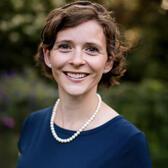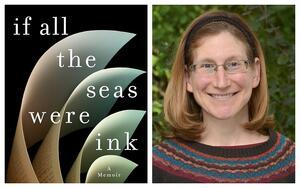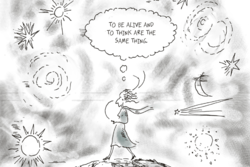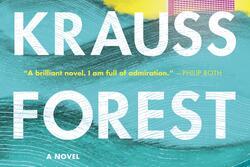An Interview with Ilana Kurshan about "If All The Seas Were Ink"
JWA sat down with author Ilana Kurshan to discuss her award-winning memoir, If All The Seas Were Ink, one of our 2018-2019 Book List picks. If All The Seas Were Ink takes her readers on a guided tour of the Talmud while detailing her personal stories of love, loss, marriage, and motherhood.
In If All The Seas Were Ink, you beautifully weave your personal experiences with fertility, labor, and parenting into this memoir, and explain how you have adapted prayers to include your lived experience. Can you share with us how you navigate altering traditional observances to allow for a more progressive, feminist perspective?
I grew up in an observant Jewish home, and I continue to find much meaning and inspiration in the liturgy and rituals of Jewish tradition. I have been reciting the same prayers since I first learned how to read, but as I grow and change, those prayers take on new meaning. For instance, there is a blessing in the silent Amidah prayer in which we ask God to endow us with knowledge, discernment, and wisdom. When I was in elementary school, I used to recite that blessing and add a silent prayer for God to help me do well on my spelling test the next day. Years later, when I started dating seriously, I began adding to that blessing an earnest plea to God to help me discern the man who was right for me. And now, as a mother, I often insert into this blessing a fervent prayer for God to help me figure out how to respond appropriately to my children, and how to help them grow and learn about the world.
Jewish rituals, too, have taken on new meaning for me as I have progressed through various life stages. I learned to read from the Torah even before my bat mitzvah. As a teenager, I was always very excited to chant from the Torah, because I got to stand up on the bimah next to my father, who was the rabbi of the synagogue. Now as a mother, I always bring one of my daughters with me to shul when I read from the Torah. The gabbai pulls over a chair for her and she stands next to me as I read, sometimes holding an extra yad (Torah pointer) in her hand and pretending to follow along. It is important to me that my daughters grow up thinking that it is perfectly natural for women and men to take part in all aspects of Jewish life. This is not just about feminism—it’s about ensuring that all the members of the Jewish community have access to Torah.
These days I rarely get to synagogue in time to hear the morning benedictions, but not long ago, I was at minyan early on a Thursday morning for my nephew’s bar mitzvah. It was an Orthodox shul and I stood behind the mechitza with my daughters, who were happily amusing themselves with a keychain while I davened. I heard the prayer leader say the blessing thanking God “for not making me a woman.” I had not heard that blessing in a long time. In my own prayers, I always substitute it with a prayer thanking God for making me in His image. And so when I heard that blessing recited that morning, I was taken aback. Thank God for not making me a woman? How could anyone say such a blessing? I wanted to holler out: “She-asani isha!” Thank God for making me a woman! My religious life has been so deeply enriched by roles that I would not have been able to take on had I been a man. My most spiritual experiences were pregnancy and childbirth. In carrying human life inside me and bringing a child into the world, I felt closest to God as creator. I davened with the most fervor when I was pregnant, conscious of how much was beyond my control even as it was taking place just millimeters beneath the surface of my skin. The experience of bringing life into the world has been my Holy of Holies—it has been my most profound experience of intimacy with God, and I am so grateful to God for having had this privilege.
You write about the “rich literary heritage” you grew up with in America and your intentionality in exposing your children to these books. What are some of the stories you have passed onto your children that still have a place on your bookshelf?
Each week I try to share with my children at least some aspect of the weekly Torah portion. This is easy during Genesis and the early parts of Exodus, where we read aloud each week from an illustrated book of Bible stories and discuss why Cain resented Abel, and whether it was right of Jacob to trick Esau, and when Moses figured out that he was Jewish. (I will say, though, that it was difficult to find a parsha book that included pictures of women—in Israel, most books about Torah are still published by ultra-Orthodox publishing houses, and the women are either invisible or lacking facial features. Now, thankfully, we have Emily Amrousi’s Ha-Parasha series, which has vivid illustrations, gives biblical heroines their due, and even largely distinguishes between the text of the Torah and the later midrashic commentaries.)
It gets more difficult to teach parsha starting in early spring, when we get to detailed accounts of the building of the mishkan, the portable sanctuary that the Israelites carried around through the desert, and the laws of purity and impurity. But each week I find some way to make the parsha relevant. I love to bake with my kids, so often we make a parsha-themed dessert. Every year on parshat Vayetze, for instance, we make a Jacob’s ladder cake with marshmallow angels ascending and descending a licorice stairway. I want my children to develop, even from a very young age, a feel for how the Jewish calendar bends to the arc of the Torah reading cycle. Moses describes Torah as a morasha, an inheritance passed down through the generations. My children don’t know how to read yet, but whenever we learn together, I pass out copies of the text to each of them. I want them to feel like they are receiving Torah, that it is becoming theirs.
Since my kids are growing up in Israel, it is especially important for me to share with them the American books that were such an important part of my childhood. Right now I’m reading them the Little House on the Prairie series—my three daughters have already started fighting over who gets to be the vivacious Laura and who has to be goody-two-shoes Mary and boring baby Carrie when they act out the various scenes. We’ve already torn through most of the “Kind Family” books, as my kids refer to the Sydney Taylor series. And my son and I have read through most of Roald Dahl and E.B. White, laughing together at the BFG and rooting for Stuart Little.
Part of what I love most about being a parent is the license it grants me to reread the favorite books of my childhood, experiencing them afresh through the eyes of my children. The kids are forever begging me to read one more page, but all too often I just want to stop on the page we are on and savor that moment. The other series my kids love, Cam Jansen, is about a girl who has a photographic memory; when she closes her eyes and says “click,” she can store a perfect image of whatever she has just seen. One of my daughters likes to imitate Cam, and every so often she will close her eyes, say click, and ask me to quiz her on what she has just seen and stored in her memory. I get it. When all of us are piled up on her trundle bed to read in pajamas, the toddler in my lap, the twins on each of my sides, and my son climbing over his sisters, I sometimes wish I could stop for a moment to close my eyes and say click.
In discussing the divinity of the Torah and the role midrash (creative commentary) has to make the Bible relevant today, which modern scholars do you turn to? Are there any female scholars whose teachings resonate with you?
I teach at the Conservative Yeshiva in Jerusalem, where I try to incorporate both ancient and modern midrashim into my classes. I teach a course entitled Romantic Rabbis, about stories of love and romance in the Talmud, and in nearly every class we read an excerpt from one of Ruth Calderon’s books. Calderon, an Israeli educator and politician, retells Talmudic stories from the perspective of one of the more marginalized characters, often a woman, thereby giving voice to those who are otherwise voiceless. I also draw heavily on the work of Avivah Zornberg, whose brilliant analyses of many of my favorite midrashim have irrevocably transformed the way I read various Biblical passages. And finally, Tamar Biale’s Dirshuni, an anthology of new midrashim written by contemporary Israeli women, has reminded me of the power of midrash to render the text relevant and resonant in every generation.








finished over Shavuot
Husband finished today
WOW!
Reading 'Ayn Yaakov'present from maternal saba decades ago. so, thanks
Totally immersed in
"If all the seas were ink".
Knew Ilana when she was a child at Huntington Jewish Center.
She continues to delight us.
Phylis Newman